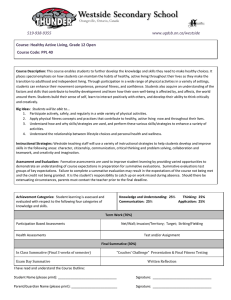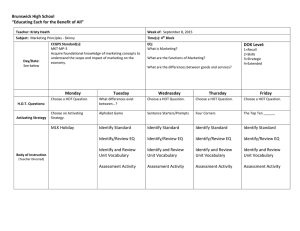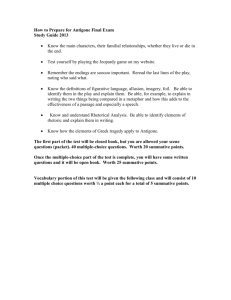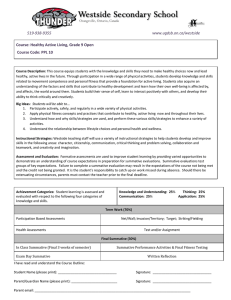SUMMATIVE ASSESSMENT DEFINITION OF TYPES Summative
advertisement
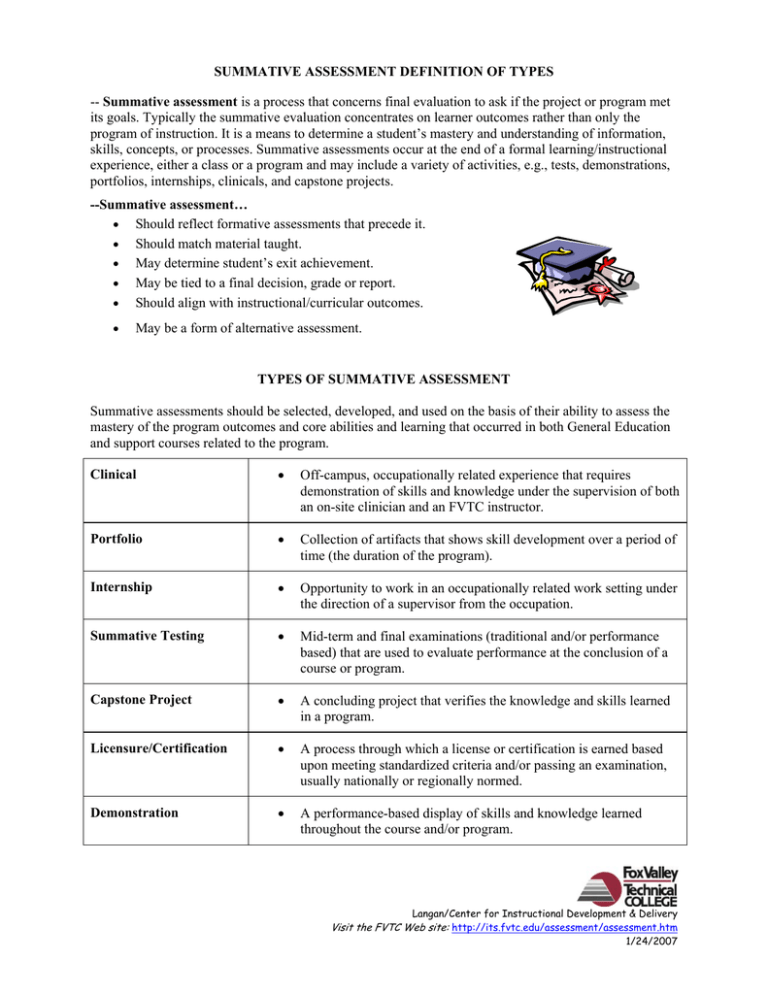
SUMMATIVE ASSESSMENT DEFINITION OF TYPES -- Summative assessment is a process that concerns final evaluation to ask if the project or program met its goals. Typically the summative evaluation concentrates on learner outcomes rather than only the program of instruction. It is a means to determine a student’s mastery and understanding of information, skills, concepts, or processes. Summative assessments occur at the end of a formal learning/instructional experience, either a class or a program and may include a variety of activities, e.g., tests, demonstrations, portfolios, internships, clinicals, and capstone projects. --Summative assessment… • Should reflect formative assessments that precede it. • Should match material taught. • May determine student’s exit achievement. • May be tied to a final decision, grade or report. • Should align with instructional/curricular outcomes. • May be a form of alternative assessment. TYPES OF SUMMATIVE ASSESSMENT Summative assessments should be selected, developed, and used on the basis of their ability to assess the mastery of the program outcomes and core abilities and learning that occurred in both General Education and support courses related to the program. Clinical • Off-campus, occupationally related experience that requires demonstration of skills and knowledge under the supervision of both an on-site clinician and an FVTC instructor. Portfolio • Collection of artifacts that shows skill development over a period of time (the duration of the program). Internship • Opportunity to work in an occupationally related work setting under the direction of a supervisor from the occupation. Summative Testing • Mid-term and final examinations (traditional and/or performance based) that are used to evaluate performance at the conclusion of a course or program. Capstone Project • A concluding project that verifies the knowledge and skills learned in a program. Licensure/Certification • A process through which a license or certification is earned based upon meeting standardized criteria and/or passing an examination, usually nationally or regionally normed. Demonstration • A performance-based display of skills and knowledge learned throughout the course and/or program. Langan/Center for Instructional Development & Delivery Visit the FVTC Web site: http://its.fvtc.edu/assessment/assessment.htm 1/24/2007 Checklist for Creating and Evaluating Summative Assessment Tools Adapted from NTC’s “Criteria for Exit Assessment” (2001) Criterion Yes No Tool/activity includes: • performance-type assessment of each program outcome. • performance-type assessment of each core ability. • performance-type assessment of General Education requirements (where not already included in program outcomes). • performance-type assessment of support course requirements (where not already included in program outcomes). • has been collaboratively developed and validated by all program instructors, with input from General Education instructors, as appropriate. • assessment performance criteria for each program outcome. • assessment performance criteria for each core ability. • student self-assessment (with criteria). An agreed-upon scoring guide for the summative assessment tool/activity has been collaboratively developed by program instructors with input from external resources as appropriate. Tool/activity is validated by program faculty with input from advisory committee members and/or other external resources. Information guides have been prepared for and discussed with students at the beginning of the program and during the final semester before the summative assessment is administered. Langan/Center for Instructional Development & Delivery Visit the FVTC Web site: http://its.fvtc.edu/assessment/assessment.htm 1/24/2007
